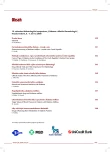-
Medical journals
- Career
Enteral and Parenteral Nutrition with Diabetes
Authors: L. Sobotka
Authors‘ workplace: Klinika gerontologická a metabolická Lékařské fakulty UK a FN Hradec Králové, přednosta prof. MUDr. Luboš Sobotka, CSc.
Published in: Vnitř Lék 2009; 55(4): 354-356
Category:
Overview
In type I diabetes insulin must be administered during nutritional support. The method of insulin administration is dependent on the clinical situation, presence of inflammation, method of nutrition delivery (enteral or parenteral) and other conditions. In type II diabetic patients oral drug treatment should be stopped in stress conditions. Obese type II diabetic patients often profit from hypocaloric nutrition but only when they are stable and any acute inflammatory illness has passed. This may improve their condition before elective procedures. However, strict monitoring of these patients is necessary in both types of diabetes mellitus.
Key words:
diabetes mellitus – enteral nutrition – parenteral nutrition – insulin
Sources
1. Clement S, Braithwaite SS, Ahmann A et al. Management of diabetes and hyperglycemia in hospitals. Diabetes Care 2004; 27 : 553–591.
2. McMahon MM. Management of parenteral nutrition in acutely ill patients with hyperglycemia. Nutr Clin Pract 2004; 19 : 120–128.
3. Pickup J, Keen H. Continuous Subcutaneous Insulin Infusion at 25 Years: Evidence base for the expanding use of insulin pump therapy in type 1 diabetes. Diabetes Care 2002; 25 : 593–598.
4. Fatati G, Mirri E, Del Tosto S et al. Use of insulin glargine in patients with hyperglycaemia receiving artificial nutrition. Acta Diabetol 2005; 42 : 182–186.
5. Christianson MA, Schwartz MW, Suzuki N. Determinants of insulin availability in parenteral nutrition solutions. JPEN 2006; 30 : 6–9.
6. McCowen KC, Friel C, Sternberg J et al. Hypocaloric total parenteral nutrition: effectiveness in prevention of hyperglycemia and infectious complications – a randomized clinical trial. Crit Care Med 2000; 28 : 3606–3611.
7. Van den Berghe G, Wouters P, Weekers F et al. Intensive insulin therapy in critically ill patients. N Engl J Med 2001; 345 : 1359–1367.
8. Van den Berghe G, Wilmer A, Milants I et al. Intensive insulin therapy in mixed medical/surgical intensive care units: benefit versus harm. Diabetes 2006; 55 : 3151–3159.
Labels
Diabetology Endocrinology Internal medicine
Article was published inInternal Medicine

2009 Issue 4-
All articles in this issue
- Pharmacoeconomy of diabetes mellitus – trends in the Czech Republic
- Potential New Antidiabetics for the Next Decade
- Importance of the Structure of Insulin Preparations for Clinical Practice
- Functional Foodstuffs and Diabetes – Evidence and Myths
- Natural substances affecting type 2 diabetes
- New and Older Pharmaceuticals Influencing Insulin Secretion
- Insulin Sensitizing Drugs
- Costs of Type II Diabetes in the Conditions of the Czech Republic’s Medical Care System
- Drug Clinical Trials and Their Importance for Diabetology
- Clinical Studies That Have Influenced the Treatment of Diabetes
- Enteral and Parenteral Nutrition with Diabetes
- Hypolipidemic drugs and diabetes mellitus
- Target Values of Blood Pressure in Patients with Diabetes Mellitus
- Drugs Influencing Bone Metabolism in Diabetic Patients
- Hypothyroidism Substitution and Adrenal Insufficiency in Diabetic Patients
- Options of Hormonal Contraceptives and Substitution in Female Diabetic Patients
- Pharmaceutical Care of Patients with Diabetes Mellitus and Its Relationship to Clinical Pharmacy
- Improving Blood Pressure Control with Physician/Pharmacist Collaboration
- Drug Interactions of Selected Drugs Used by Patients with Diabetes Mellitus
- Drug‑drug interactions in diabetic patients at the department of clinical pharmacology
- Internal Medicine
- Journal archive
- Current issue
- Online only
- About the journal
Most read in this issue- Target Values of Blood Pressure in Patients with Diabetes Mellitus
- Drug Interactions of Selected Drugs Used by Patients with Diabetes Mellitus
- Options of Hormonal Contraceptives and Substitution in Female Diabetic Patients
- Insulin Sensitizing Drugs
Login#ADS_BOTTOM_SCRIPTS#Forgotten passwordEnter the email address that you registered with. We will send you instructions on how to set a new password.
- Career

